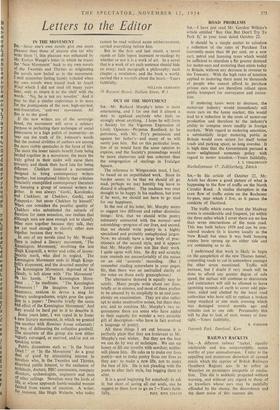OUT OF THE MOVEMENT
Silt—Mr. Richard Murphy's letter is most entertaining, and 1 for one feel it almost a duty to applaud anybody who feels so strongly about anything. I hope he will form a Society for the Vigorous Expression of Lively Opinions Pcrpetua Reedbeck to be patroness, with Mr. Fry's permission and against her father's—and many of us will surely join him. But on this particular issue, few of us would have the same opinion to express, and the Society's proceedings would he more clamorous and less coherent than the congregation of starlings in Trafalgar Square.
The reference to Wittgenstein must, I feel, be based on an unpublished work. Since its burden seems to be 'that we should all go mad, perhaps we may humbly beg leave to discard it altogether. The madman was once thought to be happy in his madness, but even if he were, we should not have to go mad for our happiness, In the rest of his letter, Mr. Murphy seems to suggest two different and rather dissimilar things: first, that we should write poetry intimately connected with the normal—and astonishing—progress of our lives, and second. that we should write poetry in a highly specialised and probably metaphysical jargon. Now, we already have a large body of prac- titioners of the second style, and it appears that Mr. Murphy does not like their work. I quite agree with him. Its dry and scratchy tone reminds me uncomfortably of the noises on an old ' acoustic ' recording. (But I remember reading somewhere in your pages. Sir, that there was an unrivalled clarity of the voice on those early gramophones.) The alternative demand is equally easy to satisfy. Many people write about our liyes, briefly or in extcnso, and most of them profess to be amazed by its simplicity to us and ,com- plexity on examination. They are also rather apt to make unattractive noises, but there they are; and to combine Mr. Murphy's two re- quirements there are some who have added to their capacity for wonder a very enviable gift of description—who have in fact evolved a language of poetry, All these things I set out because it is perfectly plain that they are irrelevant to Mr.
Murphy's real wishes. But they are the best we can do by way of technique. We can sip honey or fill our mouths with sawdust; neither
will please him. He asks us to make our lives
poetry—not to make poetry from our lives as they are: to make a new life, not to make the best of life. He is not pleading with the poets to alter their style, but begging them to alter.
It is a good beginning for somebody to ask it; but short of saving all our souls, can he suggest to them how to go on ?—Yours faith-


































 Previous page
Previous page